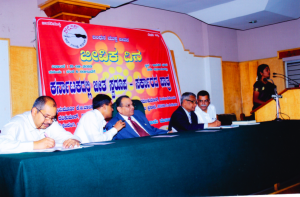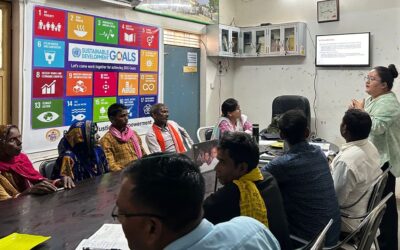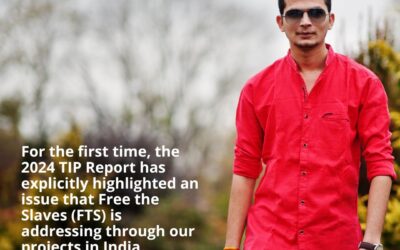Karnataka, India—September 15 was JEEVIKA Day, a celebration of anti-slavery activism. For the first time ever, activists and representatives from local government convened for a public dialogue on the extent of slavery—and the government’s role in combating it.
Since 1990, the Indian NGO JEEVIKA has been working to end bonded labor and slavery in the state of Karnataka, India. Slavery is outlawed in India. But many are not aware of their legal rights, and bonded labor flourishes.
Headed by former Jesuit priest Kiran Prasad, JEEVIKA representatives go door-to-door to alert slaves that the law is actually on their side. They help bonded laborers file court papers and guide them through the legal process of emancipation and debt relief.
Because of their exemplary work, Free the Slaves has given JEEVIKA the 2010 Harriet Tubman Freedom Award, presented annually to one community-based organization that demonstrates how slavery can be dismantled and destroyed.
Read how one former bonded laborer has become an anti-slavery activist with JEEVIKA.
Here, exclusive to Free the Slaves, Kiran shares his reflections on JEEVIKA Day. (Text has been edited for length).

Activists and members of the local government in Karnataka, India gather to discuss bonded labor. Photo courtesy of JEEVIKA.
As part of JEEVIKA Day, a public dialogue was held on the extent of bonded labor in Karnataka, and the role of government to eradicate it. The talk was held in the conference hall of the legislator’s home, in front of an audience of almost 150. Activists and representatives from local government took part—including Justice B.C. Patel, member of the National Human Rights Commission, Dr. Ravivarma Kumar of the Karnataka Permanent Backward Classes Commission and P. Ravikumar, the Principal Secretary of the ministry that monitors the implementation of the Act on Bonded Labor—the law that makes slavery illegal.
JEEVIKA has identified nearly 2,000 bonded laborers in the state of Karnataka. In 2009, the Karnataka government launched an Action Plan on bonded labor. But this plan has been difficult to implement. Officials are very slow to act. Every time a new officer takes charge, activists are required to exert a lot of effort in convincing them of their duty.
There are others obstacles in our work. The majority of bonded laborers are afraid to come out in the open. The keepers of bonded labor create an intimidating atmosphere. Activists face threats. Many JEEVIKA representatives are former bonded laborers, and some told their stories at the gathering. One person graphically described how slaveholders tried to kill him.
P. Ravikumar, the principal secretary of the ministry that monitors the implementation of the Bonded Labor Act said he was moved by the dialogue. Had he known how powerful the meeting was going to be, he said, he would have brought all his colleagues with him.
Though he had been a district magistrate in most of the northern districts, he said he was never made aware of any cases of bonded labor.
Dr. Ravivarma Kumar, Senior Advocate and former Chairman of the Karnataka Permanent Backward Classes Commission compared the caste-based bonded labor system to apartheid. He noted there are 30,000 hamlets of Dalits (the “untouchable” caste) and Adivasis (the indigenous population of India), which are segregated from the main villages for the purpose of ensuring bonded and cheap labor. Kumar called upon the National Human Rights Commission to work towards abolishing the bonded labor system—India’s version of apartheid.
Justice B.C. Patel, member of the National Human Rights Commission lamented the apathy of bureaucrats. Despite the creation of progressive anti-slavery laws, bonded labor persists. He called upon officials to respond to cases of bonded labor with a heart. Sri Nitish Ramesh, a young advocate who translated Justice Patel’s speech also offered some insights: he suggested that new government officials should be made to go through a sensitization program on bonded labor.
JEEVIKA Day was a success, in that all the important people came together to discuss the issue of bonded labor. We were relieved to hear that our presentations moved the Principal Secretary of the government department entrusted to monitor the implementation of the Bonded Labor Act. This attitude opens up the possibility for effective action against slavery in Karnataka. Dr. Kumar’s illuminations on the intimate connection between bonded labor and the caste system have further validated JEEVIKA’s belief that these two entities are intrinsically linked. Much hope has been generated amongst the anti-slavery activists here.



